|
|
|
Sort Order |
|
|
|
Items / Page
|
|
|
|
|
|
|
| Srl | Item |
| 1 |
ID:
119218
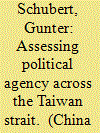

|
|
|
|
|
| Publication |
2013.
|
| Summary/Abstract |
The migration of Taiwanese to the Chinese mainland is one of the most striking features of the deepening interaction and integration across the Taiwan Strait. Among these newcomers, Taiwanese businesspeople (taishang) have long since been considered an important 'linkage community' that profoundly affects the dynamics of cross-Strait relations. However, to what extent can and do they exert political agency in cross-Strait relations? Drawing on recent literature, as well as fieldwork conducted between 2006 and 2009 in Taiwan, the Pearl River Delta (Dongguan), and the Kunshan-Shanghai metropolitan area, this article begins by analysing the political mindset of the taishang, most notably with respect to their understanding of themselves as political actors. It then looks at different dimensions of political agency exercised by the taishang in both China and Taiwan. Since little is known about their strategies to politically safeguard their group-specific interests, the findings and assessments presented here can only be preliminary. Nevertheless, the article contributes to a better understanding of the concept of linkage community and provides a useful foundation for further investigations of the taishang's political role in shaping cross-Strait relations.
|
|
|
|
|
|
|
|
|
|
|
|
|
|
|
|
| 2 |
ID:
175169


|
|
|
|
|
| Summary/Abstract |
This article considers what is necessary politically to respond to the empirical challenge of climate change and to the present calls of climate science (a carbon-neutral world by 2050). Its basic argument is that, among an array of national and international actors, it remains the state that can drive a successful politics of climate change. Without the heavy-lifting of the state and the state’s ability as a national entity to motivate behavioural change, neither the daunting scale nor imminent time-horizon of climate mitigation and adaptation is possible. The article shows how this specific argument, far from pitching anew nationalism against internationalism, can bring the two presently polarized movements together. The article then suggests that if these arguments are essentially valid, the discipline of International Relations needs to focus much more on the climate challenge, re-engage with its traditions of thought on the state and help harbour a specific disposition or mindset in the research and teaching of the discipline for the next decades: a fierce optimism.
|
|
|
|
|
|
|
|
|
|
|
|
|
|
|
|
| 3 |
ID:
129484
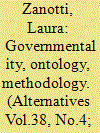

|
|
|
|
|
| Publication |
2013.
|
| Summary/Abstract |
Some critical international relations scholars have adopted theories of governmentality both as a heuristic framework for exploring modalities and functions of power and as a descriptive tool to explore the oppressive effects of global liberalism. I argue that, as a descriptive tool, much governmentality literature remains rooted in the same substantialist ontology and epistemology as the liberal discourses it seeks to criticize. This ontological orientation especially has a bearing on conceptualizations of political agency, which remain confined to the liberal struggle of power and freedom. I suggest that reimagining political agency calls for a reorganization of the ontological and epistemological framework of international relations in non-substantialist ways. The analysis maps non-substantialist positions across disciplinary lines. By treating power and subjects as deeply imbricated, non-substantialist ontologies examine political engagements as processes of hybridization aimed at producing practical effects in specific contexts.
|
|
|
|
|
|
|
|
|
|
|
|
|
|
|
|
| 4 |
ID:
125347
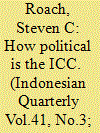

|
|
|
|
|
| Publication |
2013.
|
| Summary/Abstract |
The International Criminal Court faces many daunting political challenges in Kenya, Libya and Sudan. It has addressed these challenges and defended its impartiality in these situations by insisting that it remains an apolitical institution. This article challenges the conventional focus on the ICC`s apolitical nature by adopting an alternative approach that examines its political and pragmatic role in seeking mutual accommodation. It argues that the ICC can and should seek mutual accommodation rather than simply justice under the Rome Statute. In doing so, the article develops and applies the term diplomatic efficacy, or the political capacity of the ICC to produce acceptable solutions, by addressing the soft power dimension of such efficacy. The ICCS`s diplomatic efficacy not only reflects its special role as an independent court or agent in the interstate system, but also represents a practical and strategic to manage the political problems that its interventions and deferral to national authorities may create. The article concludes that the ICC`s political efficacy can help to resolve the incongruities between proactive complementarity and the provisions of cooperation encoded in the Rome Statute
|
|
|
|
|
|
|
|
|
|
|
|
|
|
|
|
| 5 |
ID:
133296
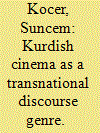

|
|
|
|
|
| Publication |
2014.
|
| Summary/Abstract |
Within the last few years, "Kurdish cinema" has emerged as a unique discursive subject in Turkey. Subsequent to and in line with efforts to unify Kurdish cultural production in diaspora, Kurdish intellectuals have endeavored to define and frame the substance of Kurdish cinema as an orienting framework for the production and reception of films by and about Kurds. In this article, my argument is threefold. First, Kurdish cinema has emerged as a national cinema in transnational space. Second, like all media texts, Kurdish films are nationalized in discourse. Third, the communicative strategies used to nationalize Kurdish cinema must be viewed both in the context of the historical forces of Turkish nationalism and against a backdrop of contemporary politics in Turkey, specifically the Turkish government's discourses and policies related to the Kurds. The empirical data for this article derive from ethnographic research in Turkey and Europe conducted between 2009 and 2012.
|
|
|
|
|
|
|
|
|
|
|
|
|
|
|
|
| 6 |
ID:
174466


|
|
|
|
|
| Summary/Abstract |
Violent movements in different parts of the world have employed large numbers of women fighters. I address the question of how and why so many women from diverse backgrounds join an ethnic insurgency. Informed by an intersectional approach, I suggest that when gender and ethnic inequalities overlap, an ethnic insurgency promising gender emancipation would have strong appeal among women. At the same time, the intersection of class and gender shapes distinctive patterns of mobilization among women of an ethnic minority. In particular, uneducated women with lower class backgrounds join the movement because it provides them with the most viable way out of patriarchal relations. I employ a multi-method research design to study a paradigmatic case of women in arms, the Kurdish insurgency. I use an original large dataset containing information about more than 9,000 militants, from extensive fieldwork entailing dozens of in-depth interviews, and an archival study of sources in primary languages. My findings reveal the effects of unequal relationships based on ethnicity, gender, and class on violent political mobilization and the ambivalent relationship between women’s political agency and empowerment.
|
|
|
|
|
|
|
|
|
|
|
|
|
|
|
|
| 7 |
ID:
123393
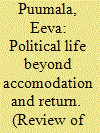

|
|
|
|
|
| Publication |
2013.
|
| Summary/Abstract |
This article explores political agency in the interstices of the bodily politics of asylum. It shows how its practices make bodily surfaces and how alternative forms of political authority emanate from bodies. Relying on Jean-Luc Nancy's ontology of the body, it examines forms of political agency that are enacted by people often considered as abjective subjectivities in the spaces of the international. Deriving from interviews conducted with failed asylum seekers, the article sheds light on agencies and resistances embedded in and extant despite the governmental efforts to solve the problem of the moving body. Ethnographic data and interviews with the failed asylum seekers show how they take control over their lives, not as separate, sovereign subjects, but in relation to their political surroundings and others. In a way, the failed asylum seekers produce and practice their own politics that both takes part in and exceeds the limits set by sovereign politics. By exploring political agency from underneath and beyond sovereign power and governmentality, the article presents a reading of the intertwining of the international, political, and bodily.
|
|
|
|
|
|
|
|
|
|
|
|
|
|
|
|
| 8 |
ID:
123528
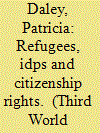

|
|
|
|
|
| Publication |
2013.
|
| Summary/Abstract |
Persistent civil warfare has created a crisis of protection for vulnerable refugees/returnees and internally displaced people ( idps ) in the African Great Lakes region. This is in the context of increasing state hostility towards refugees, intensified inter-group competition among citizens, and rising xenophobia towards African 'foreigners'. Humanitarian solutions are often de-contextualised from struggles over entitlements, citizenship and exclusionary practices based on social hierarchies, ethnicity and indigeneity. Hence, they tend to contribute to rather than alleviate the marginality experienced by the displaced. This article argues for further exploration of the processes of identity construction that accompany displacement and humanitarianism and their problematic relationship with sovereignty and citizenship. It suggests that transcending marginality requires greater emphasis on political agency within refugee and idp communities-for their voices to be part of negotiations and conversations on repatriation and integration-in order for them to rejoin the political community.
|
|
|
|
|
|
|
|
|
|
|
|
|
|
|
|
| 9 |
ID:
184207


|
|
|
|
|
| Summary/Abstract |
In 1975, the world-famous novelist Yaşar Kemal (1923–2015) undertook a series of journalistic interviews with street children in Istanbul. The series, entitled “Children Are Human” (Çocuklar İnsandır), reflects the author's rebellious attitude as well as the revolutionary spirit of hope in the 1970s in Turkey. Kemal's ethnographic fieldwork with street children criticized the demotion of children to a less-than-human status when present among adults. He approached children's rights from a human rights angle, stressing the humanity of children and that children's rights are human rights. The methodological contribution of this research to the history of children and youth is its engagement with ethnography as historical source. His research provided children the opportunity to express their political subjectivities and their understanding of the major political questions of the time, specifically those of social justice, (in)equality, poverty, and ethnic violence encountered in their everyday interactions with politics in the country. Yaşar Kemal's fieldwork notes and transcribed interviews also bring to light immense injustices within an intersectional framework of age, class, ethnicity, and gender. The author emphasizes that children's political agency and their political protest is deeply rooted in their subordination and misery, but also in their dreams and hopes. Situating Yaşar Kemal's “Children Are Human” in the context of the 1970s in Turkey, I hope to contribute to childhood studies with regard to the political agency of children as well as to the history of public intellectuals and newspapers in Turkey and to progressive representations of urban marginalization.
|
|
|
|
|
|
|
|
|
|
|
|
|
|
|
|
| 10 |
ID:
179843


|
|
|
|
|
| Summary/Abstract |
This article explores the gender dynamics of recruitment materials published by the so-called Islamic State. Through an investigation of the Islamic State’s only female-authored column in Dabiq, it reveals how a unique “voice” evokes support by urging readers to consider their agency in both the citizen–state relationship and the husband–wife patriarchal structure. It utilizes an original method of contextualizing narratives through reflexivity and responsivity. Overall, it reveals that an analysis of contemporary extremist recruitment materials must consider the mediatized environment in which it forms as well as the realistic political situations to which it responds.
|
|
|
|
|
|
|
|
|
|
|
|
|
|
|
|
| 11 |
ID:
146134


|
|
|
|
|
| Summary/Abstract |
In this article, I am concerned with the political agency available to victims of wartime violence, and the subsequent insights it generates for thinking about complicity and responsibility. The article first considers the problematic ways in which victims are cast in the discipline of transitional justice, drawing on interdisciplinary studies of gender, agency, and wartime violence. I conceptualize the political as relational and situated within a web of human relationships that make life meaningful. Political agency includes acts, gestures, and words that negotiate the value of human life within various relationships. To illustrate, I turn to the life story of Sara, a young woman who grew up in the context of prolonged conflict in northern Uganda. I conclude with thinking about how Sara's acts of political agency move us beyond static categories of victims in transitional justice, and conceive of responsibility as diffuse and socially held.
|
|
|
|
|
|
|
|
|
|
|
|
|
|
|
|
| 12 |
ID:
161389
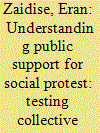

|
|
|
|
|
| Summary/Abstract |
Despite its acclaimed role in democratic theory, social protest is not a common occurrence in most states where widespread political participation is typically limited to voting, and mass participation is otherwise rare. This article examines public opinion regarding the 2011 summer protests in Israel, in which hundreds of thousands took to the streets in wide-scale events that lasted for several weeks. It does so by focusing on two independent samples, one of university undergraduate students and the other of active protesters, totaling 59 respondents. Findings suggest that support for the protest most strongly affiliated with concerns of social injustice coupled with the belief that government responsible for this state of affairs.
|
|
|
|
|
|
|
|
|
|
|
|
|
|
|
|
| 13 |
ID:
148474


|
|
|
|
|
| Summary/Abstract |
The four books under review focus on different aspects of war and conflict, but they all make it clear that women and children are more than their victims. They can be, and often are, active participants in all dimensions of conflict, from taking up arms to working for peace. While all four books paint an appropriately grim picture of war and its impact, there is also some optimism to be found in the resilience shown by women and children as they face the brutality of war and often actively seek to work for peace. Three of the books examine women's involvement in conflict, war, peace and peacemaking, and the aftermath of these events, albeit in very different ways—although all view women as active participants in the process rather than as victims. The fourth book included in this article, Children and global conflict, is not only relevant to the discussion, but also provides another important lens through which we can examine issues of conflict, war and peace. This review article provides insight into the contrition made to the field by these recent books individually, as well as when considered as parts of a whole.
|
|
|
|
|
|
|
|
|
|
|
|
|
|
|
|
|
|
|
|
|